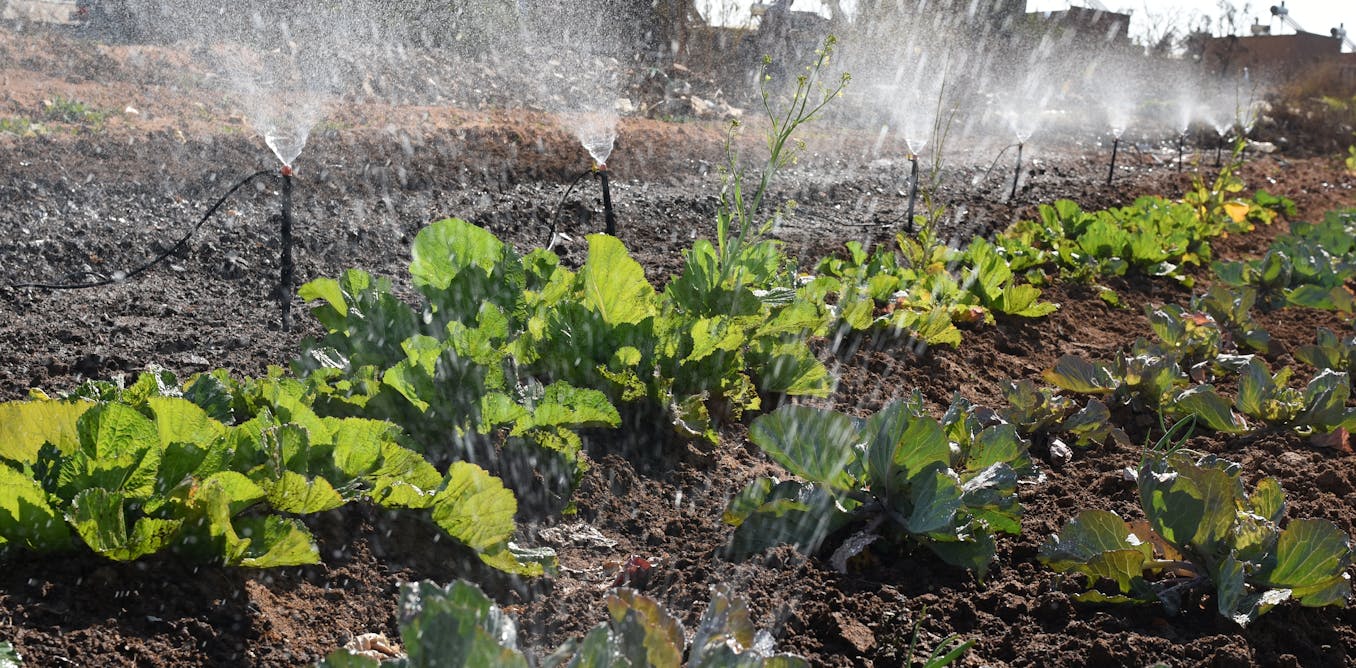
Water is essential at all stages of food production, from irrigation to food processing to washing fruit and vegetables before we eat them. Crops and livestock need it to grow, but water can also be contaminated by pathogens (any organism that causes disease), heavy metals, and chemicals.
These can be considered a potential food safety hazard when they enter the food chain. For example, contaminated irrigation water can transfer pathogens like Escherichia coli to fruit and vegetables. Eating these raw and without washing them properly can lead to severe stomach cramps, diarrhoea, nausea and fever.
We are a team of researchers from the University of Pretoria and the Water Research Commission in South Africa who have investigated bacterial pathogens in water sources for the past 20 years. We’ve developed ways to help determine whether water is of good quality when used before and after harvesting fresh produce.
With about 40 years of combined experience, we are also identifying potential hotspot environments for contamination. We’re currently tracking multi-drug resistant bacteria in South Africa’s water and assessing the implications for food safety. We have also analysed the complete supply chains of fresh produce using microbiological methods to investigate what contaminants might be circulating in vegetable production and contaminated irrigation water.
Our research is focused on ensuring that the food reaching consumers’ tables does not pose hidden health risks. Over the years, we’ve learnt these key lessons:
- Harvesting rainwater from roofs is a good idea in water-scarce rural South Africa. However, if tanks aren’t cleaned regularly, this water can be contaminated by microbes (microscopic organisms that cause disease). The slimy layer building up in water holding containers can provide a favourable environment to enable microorganisms to survive and multiply, including potential pathogenic ones that can affect human health.
- Surface water sources, such as rivers and dams, often contain high levels of E.coli and multidrug-resistant bacteria. These can be transferred onto vegetables during irrigation. This creates a potential health risk for anyone eating the vegetables without proper washing with safe water.
- South Africa’s current water quality guidelines have not been developed to test for contamination by multidrug-resistant bacteria and emerging pathogens. They mainly focus on indicator organisms such as E. coli typically associated with faeces.
To address these problems, farmers, academic researchers and the government must collaborate to develop new water quality standards. These must reflect local conditions and emerging threats. This is crucial for protecting the food system and to ensure that our food is safe.
Where contamination begins and how it can be stopped
It starts at upstream activities such as waste water from non-functional municipal sewage systems contaminating water. Such water can affect downstream farming when used for irrigation. Pathogens can attach to plants and survive and cause build up over the season to levels that can cause a concern at farm level. Small-scale farmers, who supply much of the fresh produce in informal markets, face major problems in accessing clean irrigation water.
Even if water looks clean, it can contain hidden contaminants that compromise food safety. Safe water, tested and treated to remove such hazards, is essential to prevent this. In reality, however, surface water sources (rivers, lakes, ponds) are often the only available water for crop irrigation, livestock production and domestic use. But in many areas, these water sources have been contaminated by partially treated or raw sewage that’s been released into the environment.
Our research has found that smallholder farmers’ irrigation water has transferred Salmonella and E.coli to soil and fresh produce.
Things can also go wrong at retail level. Once fruit and vegetables reaches informal markets, its safety can vary widely depending on the vendor and the practices being followed, such as putting spinach in dirty water to keep it fresh looking and prevent it from wilting. Research has also found the presence of bacterial pathogens with expanded antimicrobial resistance profiles on fresh produce at the point of sale. Further, that multidrug-resistant potentially pathogenic bacteria were present throughout spinach production, even on commercial farms where similar contaminated irrigation water was being used.
There are also threats at home. Roof-harvested rainwater contained E. coli and Enterococcus, which can transfer to vegetables watered from the tank.
What can be done about the problem?
Our research highlights the pressing need for more real-time data and context-specific water quality guidelines. These need to go beyond indicating E.coli levels, to also identifying other potential threats such as Salmonella and clusters of E. coli that produce Shiga-toxins. These can cause severe illnesses such as hemorrhagic colitis and hemolytic uremic syndrome, where blood clots damage the kidneys, potentially leading to kidney failure.
We are currently tracking antibiotic resistance in rivers. Our aim is to turn this research into practical actions for safer irrigation, better hygiene, and reduced antibiotic resistance. This will help protect South Africa against food safety hazards.
In areas that are known to have poor water quality, continuous surveillance and testing must be set up. Without this surveillance, contamination could go unnoticed, potentially affecting consumers. Food also needs to be monitored and samples taken to see if it’s free of these pathogens.
Water is essential to all life. Ensuring its safety requires strong collaboration between government, scientists, farmers, and communities.
Overall, South Africa needs a comprehensive food safety policy and to be involved in implementing a continental food safety agency and framework for more aligned regulation and control.
The team currently leading the research are Professor Lise Korsten and Dr Loandi Richter-Mouton (University of Pretoria) and Dr Eunice Ubomba-Jaswa and Dr Samkelisiwe Hlophe-Ginindza (Water Research Commission).![]()
Loandi Richter-Mouton, Researcher: Environmental Antimicrobial resistance, water quality and food safety, Department of Plant and Soil Sciences, University of Pretoria, University of Pretoria and Lise Korsten, Professor – Department of Plant and Soil Sciences and co-director of the Centre of Excellence in Food Security, University of Pretoria
This article is republished from The Conversation under a Creative Commons license.


